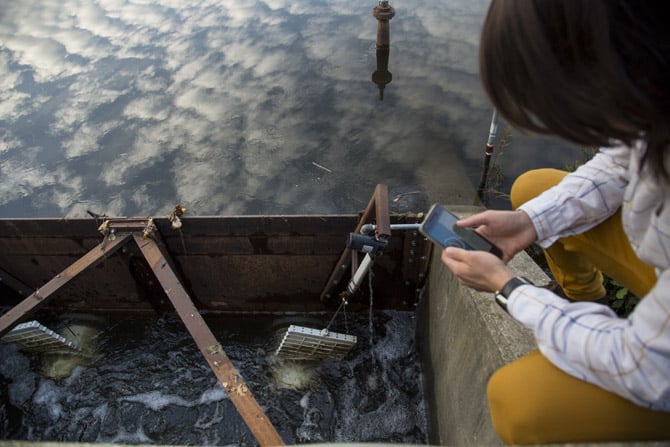BSE Degree in Environmental Engineering

What is Environmental Engineering?
The Bachelor of Science in Engineering in Environmental Engineering (BSE EnvE) program is dedicated to producing tomorrow’s leaders – those who will help society meet the challenges of global resource limitations and human environmental impacts. With a BSE EnvE, students are prepared for a career position in engineering consulting, government agencies, humanitarian organizations and much more. Environmental engineering is predicted to have one of the highest growth rates among all engineering disciplines in a few years. “Environmental engineering, in addition to being a rapidly developing field, also delivers the perfect balance of a technical degree with practical applications,” Environmental Engineering Student Hema Karunakaram says. This program gives students an opportunity to focus on sustainable infrastructure systems – such as water, sanitation and air quality – that protect human health and natural resources for current and coming generations. “I’d always known I wanted to study something related to the environment and sustainability, and work in a field where I could have positive and tangible impacts on the ecological and human systems around me,” Environmental Engineering Student Diana Bach says.
Main Focus Areas:
- Water Quality and Health
- Earth Systems
- Environmental Fluid Dynamics
- Environmental Policy and Sustainable Infrastructure
Sample Schedule
Electives
Technical electives:
At least two of the three technical electives must be CEE courses, including one design course, marked here with an asterisk (*):
- Water Quality and Health:
- CEE 428* (3): Groundwater Hydrology (F)
- CEE 480* (3): Design of Environmental Engineering Systems (F)
- CHE 342 (3): Mass and Heat Transfer
- PUBHLTH 305 (3): The Environment And Human Health
- Atmospheric and Earth Systems:
- CEE 549 (3): Geoenvironmental Engineering (W)
- CEE 563* (3): Air Quality Engineering Fundamentals (W)
- CEE 564 (3): Greenhouse Gas Control (W)
- CLIMATE 463 (3): Air Pollution Meteorology
- CLIMATE 467 (3): Biogeochemical Cycles
- EARTH 413 (3): Geomicrobiology: How Microorganisms Shape Earth and Environment
- Environmental Fluid Dynamics:
- CEE 428* (3): Groundwater Hydrology (F)
- CEE 521 (3): Flow in Open Channels (F)
- CEE 522 (3): Sediment Transport (F)
- CEE 526* (3): Design of Hydraulic Systems (W)
- Energy and Sustainable Infrastructure:
- CEE 567 (3): Energy Infrastructure Systems (F)
- URP 423 (3): Introduction to Urban and Environmental Planning
- EARTH 344 (3): Sustainable and Fossil Energy: Options and Consequences
- Environmental Policy and Entrepreneurship:
- ENGR 520 (3): Entrepreneurial Business Fundamentals for Engineers & Scientists
- EAS 475 (3): Environmental Law
- CLIMATE 480 (3): A Multidisciplinary Approach to Problem Solving
- ME 589 (3): Sustainable Design of Technology Systems
F – Course offer Fall Term
W – Course offer Winter Term
CoE Intellectual Breadth Requirement: Students need 16 total credits of Liberal Arts coursework. Of these 16 credits, 3 cr must be considered HUM and 3 cr must be 300+ level. ECON 101 or 102 are required.
CoE General Elective Requirement: Students need a total of 128 credits to graduate. The General Elective requirement uses courses that are not being counted in the Core Requirements, the Intellectual Breadth, or the Major.
Please check out the Environmental Engineering accreditation page for information about the Program Educational Objectives and more.

Undergraduate Civil and Environmental Engineering Contacts
Civil and Environmental Engineering at the University of Michigan has a team of faculty and staff dedicated to providing guidance to undergraduate students.
Hear From an Alum
Lynn Williams Stephens talks about a career in environmental engineering.